Waste Management in Western Australia: Challenges and Recommendations
VerifiedAdded on 2023/03/31
|11
|2928
|273
Report
AI Summary
This report examines the critical issue of waste generation in Western Australia, particularly focusing on Perth, and its impact on sustainability. It highlights that Western Australia has the highest per capita waste generation in the country, posing a significant challenge to achieving sustainable development goals. The report identifies factors contributing to high waste generation, including household solid waste, e-waste, construction and demolition waste, and excessive food consumption. It also discusses the behavioral aspects of waste generation, governmental actions, and the environmental impacts, such as leachate pollution and biodiversity loss. The report recommends changes in behavioral practices through awareness campaigns, increasing the number of waste transfer stations, and implementing effective waste recycling strategies to promote energy and biofuel generation. The aim is to mitigate environmental damage and foster a more sustainable approach to waste management in Perth and Western Australia.
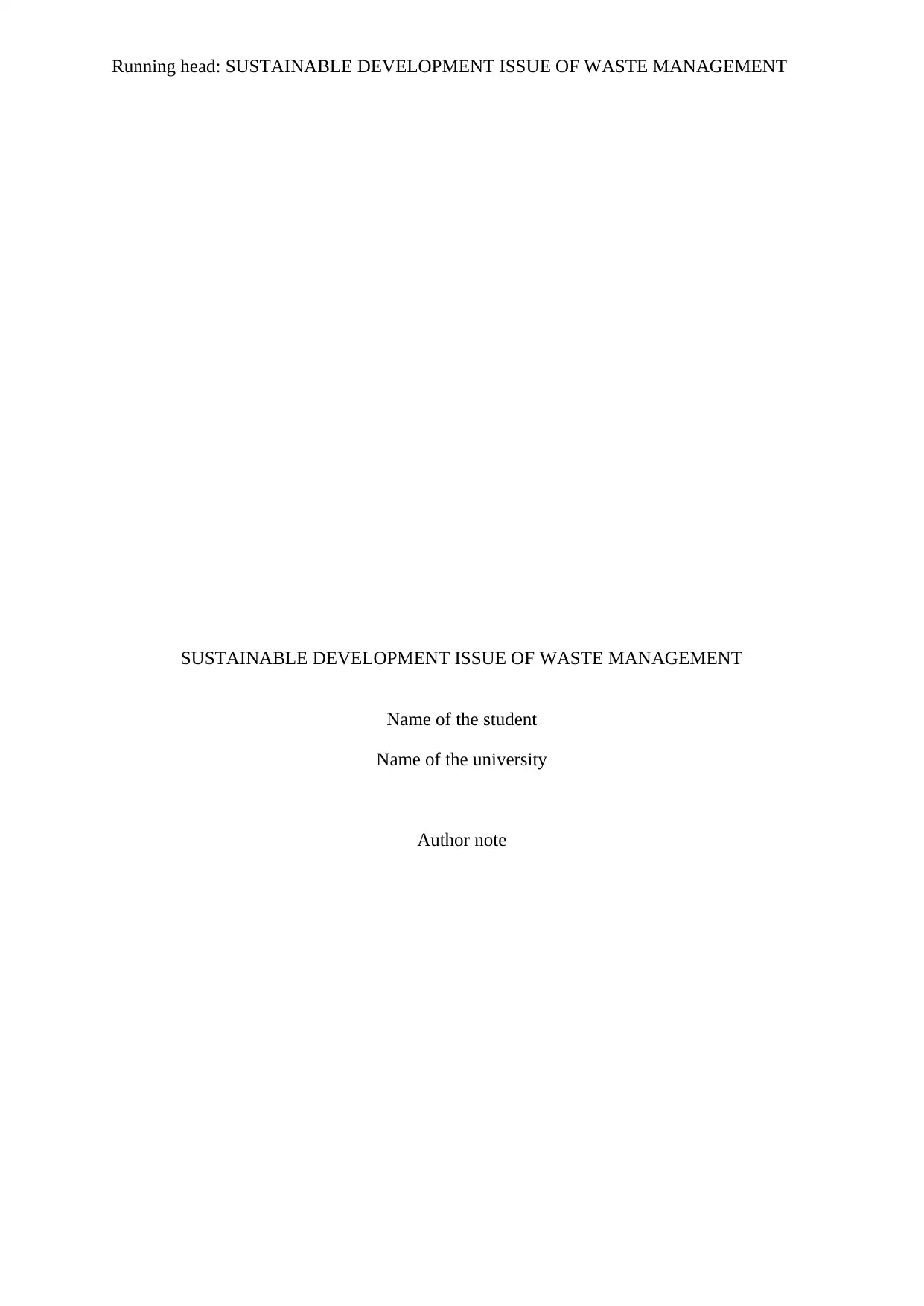
Running head: SUSTAINABLE DEVELOPMENT ISSUE OF WASTE MANAGEMENT
SUSTAINABLE DEVELOPMENT ISSUE OF WASTE MANAGEMENT
Name of the student
Name of the university
Author note
SUSTAINABLE DEVELOPMENT ISSUE OF WASTE MANAGEMENT
Name of the student
Name of the university
Author note
Paraphrase This Document
Need a fresh take? Get an instant paraphrase of this document with our AI Paraphraser
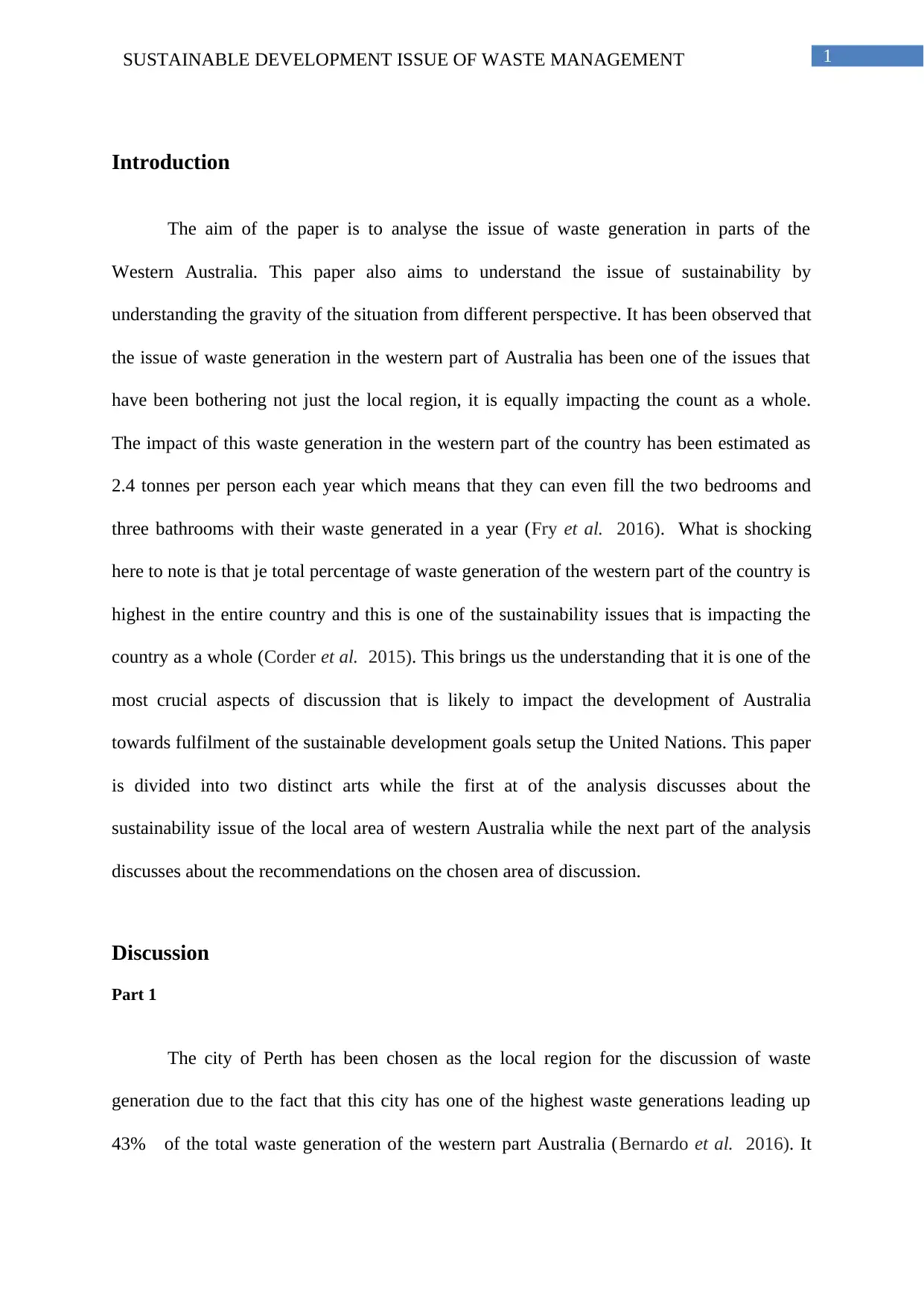
1SUSTAINABLE DEVELOPMENT ISSUE OF WASTE MANAGEMENT
Introduction
The aim of the paper is to analyse the issue of waste generation in parts of the
Western Australia. This paper also aims to understand the issue of sustainability by
understanding the gravity of the situation from different perspective. It has been observed that
the issue of waste generation in the western part of Australia has been one of the issues that
have been bothering not just the local region, it is equally impacting the count as a whole.
The impact of this waste generation in the western part of the country has been estimated as
2.4 tonnes per person each year which means that they can even fill the two bedrooms and
three bathrooms with their waste generated in a year (Fry et al. 2016). What is shocking
here to note is that je total percentage of waste generation of the western part of the country is
highest in the entire country and this is one of the sustainability issues that is impacting the
country as a whole (Corder et al. 2015). This brings us the understanding that it is one of the
most crucial aspects of discussion that is likely to impact the development of Australia
towards fulfilment of the sustainable development goals setup the United Nations. This paper
is divided into two distinct arts while the first at of the analysis discusses about the
sustainability issue of the local area of western Australia while the next part of the analysis
discusses about the recommendations on the chosen area of discussion.
Discussion
Part 1
The city of Perth has been chosen as the local region for the discussion of waste
generation due to the fact that this city has one of the highest waste generations leading up
43% of the total waste generation of the western part Australia (Bernardo et al. 2016). It
Introduction
The aim of the paper is to analyse the issue of waste generation in parts of the
Western Australia. This paper also aims to understand the issue of sustainability by
understanding the gravity of the situation from different perspective. It has been observed that
the issue of waste generation in the western part of Australia has been one of the issues that
have been bothering not just the local region, it is equally impacting the count as a whole.
The impact of this waste generation in the western part of the country has been estimated as
2.4 tonnes per person each year which means that they can even fill the two bedrooms and
three bathrooms with their waste generated in a year (Fry et al. 2016). What is shocking
here to note is that je total percentage of waste generation of the western part of the country is
highest in the entire country and this is one of the sustainability issues that is impacting the
country as a whole (Corder et al. 2015). This brings us the understanding that it is one of the
most crucial aspects of discussion that is likely to impact the development of Australia
towards fulfilment of the sustainable development goals setup the United Nations. This paper
is divided into two distinct arts while the first at of the analysis discusses about the
sustainability issue of the local area of western Australia while the next part of the analysis
discusses about the recommendations on the chosen area of discussion.
Discussion
Part 1
The city of Perth has been chosen as the local region for the discussion of waste
generation due to the fact that this city has one of the highest waste generations leading up
43% of the total waste generation of the western part Australia (Bernardo et al. 2016). It
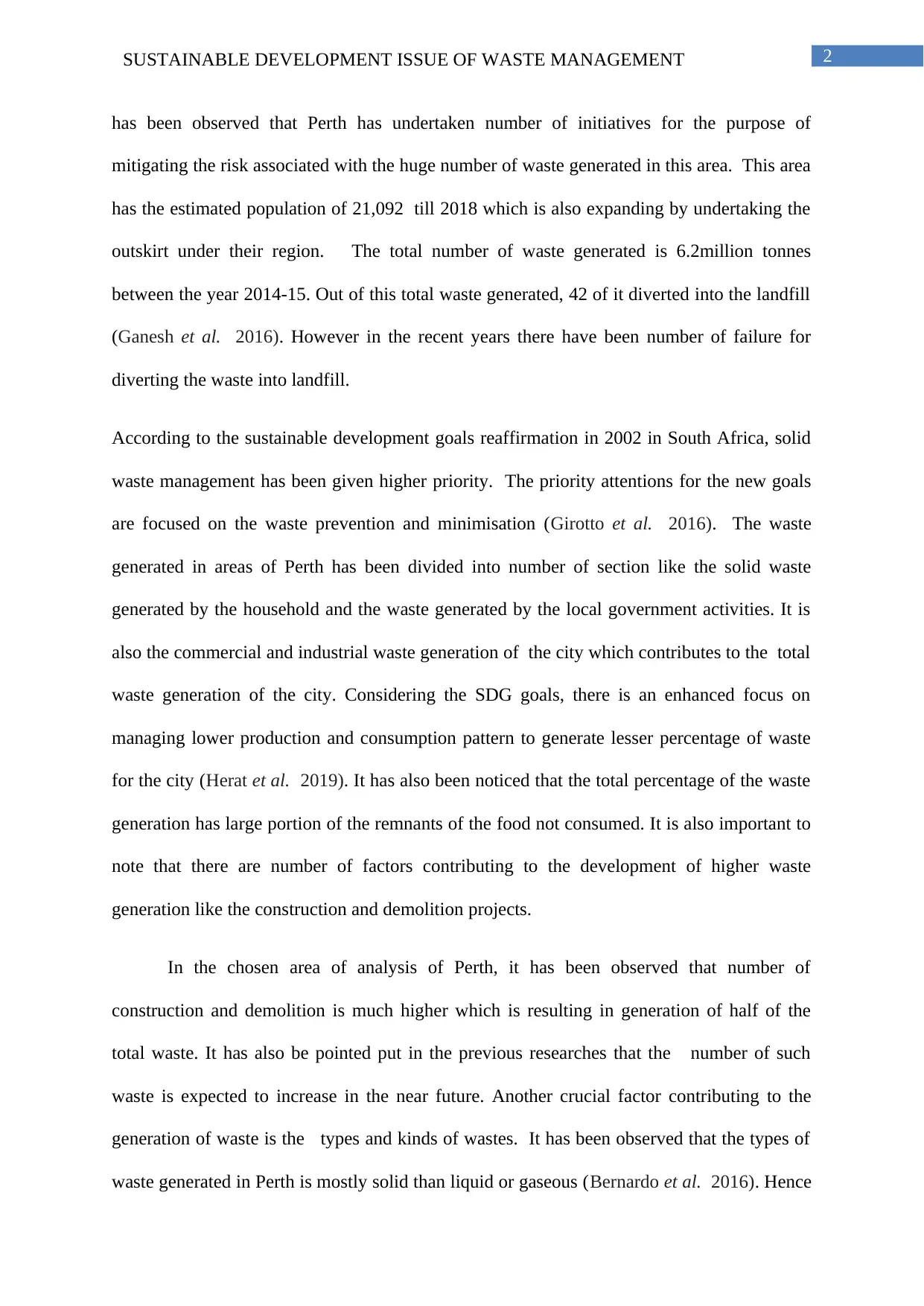
2SUSTAINABLE DEVELOPMENT ISSUE OF WASTE MANAGEMENT
has been observed that Perth has undertaken number of initiatives for the purpose of
mitigating the risk associated with the huge number of waste generated in this area. This area
has the estimated population of 21,092 till 2018 which is also expanding by undertaking the
outskirt under their region. The total number of waste generated is 6.2million tonnes
between the year 2014-15. Out of this total waste generated, 42 of it diverted into the landfill
(Ganesh et al. 2016). However in the recent years there have been number of failure for
diverting the waste into landfill.
According to the sustainable development goals reaffirmation in 2002 in South Africa, solid
waste management has been given higher priority. The priority attentions for the new goals
are focused on the waste prevention and minimisation (Girotto et al. 2016). The waste
generated in areas of Perth has been divided into number of section like the solid waste
generated by the household and the waste generated by the local government activities. It is
also the commercial and industrial waste generation of the city which contributes to the total
waste generation of the city. Considering the SDG goals, there is an enhanced focus on
managing lower production and consumption pattern to generate lesser percentage of waste
for the city (Herat et al. 2019). It has also been noticed that the total percentage of the waste
generation has large portion of the remnants of the food not consumed. It is also important to
note that there are number of factors contributing to the development of higher waste
generation like the construction and demolition projects.
In the chosen area of analysis of Perth, it has been observed that number of
construction and demolition is much higher which is resulting in generation of half of the
total waste. It has also be pointed put in the previous researches that the number of such
waste is expected to increase in the near future. Another crucial factor contributing to the
generation of waste is the types and kinds of wastes. It has been observed that the types of
waste generated in Perth is mostly solid than liquid or gaseous (Bernardo et al. 2016). Hence
has been observed that Perth has undertaken number of initiatives for the purpose of
mitigating the risk associated with the huge number of waste generated in this area. This area
has the estimated population of 21,092 till 2018 which is also expanding by undertaking the
outskirt under their region. The total number of waste generated is 6.2million tonnes
between the year 2014-15. Out of this total waste generated, 42 of it diverted into the landfill
(Ganesh et al. 2016). However in the recent years there have been number of failure for
diverting the waste into landfill.
According to the sustainable development goals reaffirmation in 2002 in South Africa, solid
waste management has been given higher priority. The priority attentions for the new goals
are focused on the waste prevention and minimisation (Girotto et al. 2016). The waste
generated in areas of Perth has been divided into number of section like the solid waste
generated by the household and the waste generated by the local government activities. It is
also the commercial and industrial waste generation of the city which contributes to the total
waste generation of the city. Considering the SDG goals, there is an enhanced focus on
managing lower production and consumption pattern to generate lesser percentage of waste
for the city (Herat et al. 2019). It has also been noticed that the total percentage of the waste
generation has large portion of the remnants of the food not consumed. It is also important to
note that there are number of factors contributing to the development of higher waste
generation like the construction and demolition projects.
In the chosen area of analysis of Perth, it has been observed that number of
construction and demolition is much higher which is resulting in generation of half of the
total waste. It has also be pointed put in the previous researches that the number of such
waste is expected to increase in the near future. Another crucial factor contributing to the
generation of waste is the types and kinds of wastes. It has been observed that the types of
waste generated in Perth is mostly solid than liquid or gaseous (Bernardo et al. 2016). Hence
⊘ This is a preview!⊘
Do you want full access?
Subscribe today to unlock all pages.

Trusted by 1+ million students worldwide
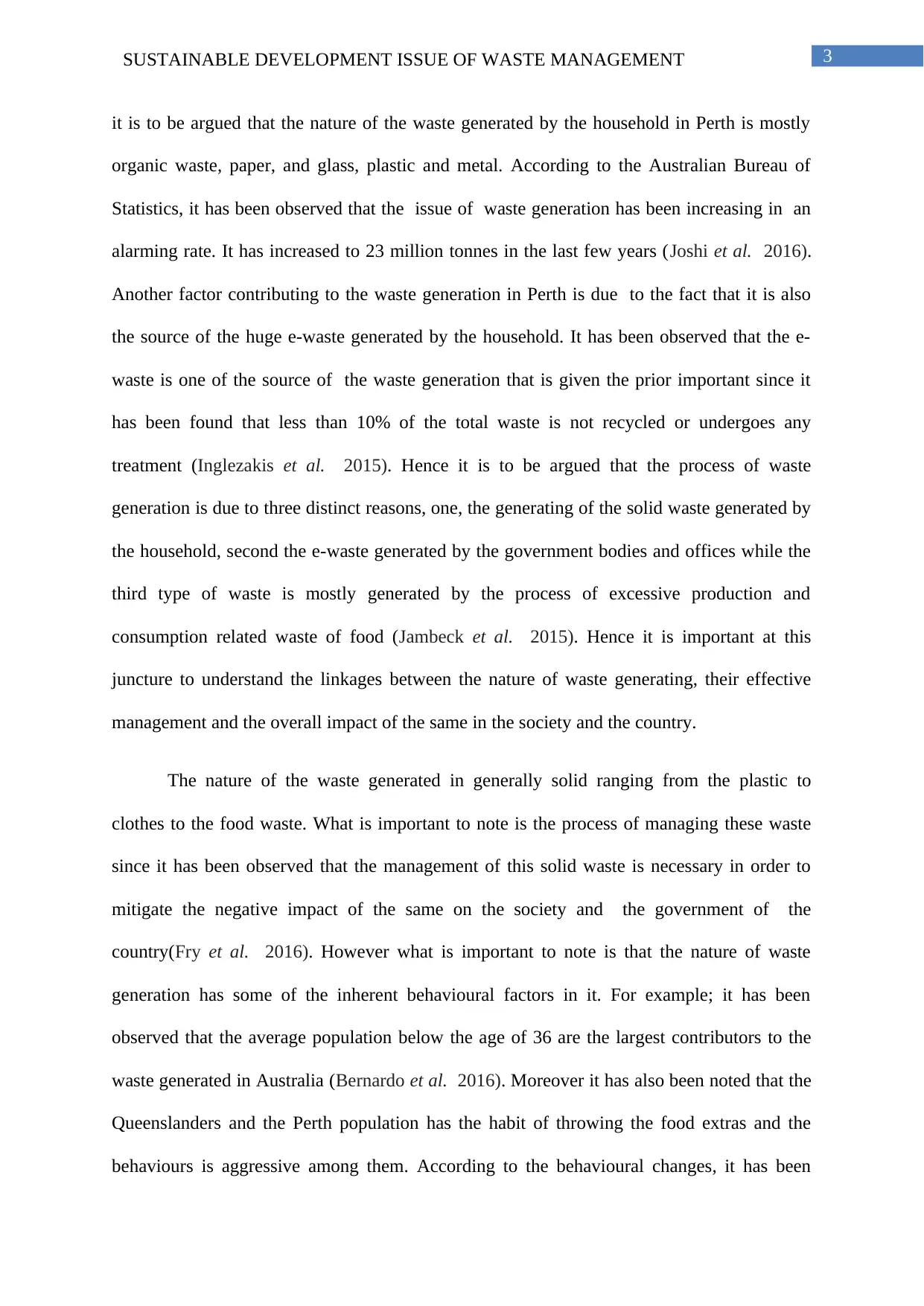
3SUSTAINABLE DEVELOPMENT ISSUE OF WASTE MANAGEMENT
it is to be argued that the nature of the waste generated by the household in Perth is mostly
organic waste, paper, and glass, plastic and metal. According to the Australian Bureau of
Statistics, it has been observed that the issue of waste generation has been increasing in an
alarming rate. It has increased to 23 million tonnes in the last few years (Joshi et al. 2016).
Another factor contributing to the waste generation in Perth is due to the fact that it is also
the source of the huge e-waste generated by the household. It has been observed that the e-
waste is one of the source of the waste generation that is given the prior important since it
has been found that less than 10% of the total waste is not recycled or undergoes any
treatment (Inglezakis et al. 2015). Hence it is to be argued that the process of waste
generation is due to three distinct reasons, one, the generating of the solid waste generated by
the household, second the e-waste generated by the government bodies and offices while the
third type of waste is mostly generated by the process of excessive production and
consumption related waste of food (Jambeck et al. 2015). Hence it is important at this
juncture to understand the linkages between the nature of waste generating, their effective
management and the overall impact of the same in the society and the country.
The nature of the waste generated in generally solid ranging from the plastic to
clothes to the food waste. What is important to note is the process of managing these waste
since it has been observed that the management of this solid waste is necessary in order to
mitigate the negative impact of the same on the society and the government of the
country(Fry et al. 2016). However what is important to note is that the nature of waste
generation has some of the inherent behavioural factors in it. For example; it has been
observed that the average population below the age of 36 are the largest contributors to the
waste generated in Australia (Bernardo et al. 2016). Moreover it has also been noted that the
Queenslanders and the Perth population has the habit of throwing the food extras and the
behaviours is aggressive among them. According to the behavioural changes, it has been
it is to be argued that the nature of the waste generated by the household in Perth is mostly
organic waste, paper, and glass, plastic and metal. According to the Australian Bureau of
Statistics, it has been observed that the issue of waste generation has been increasing in an
alarming rate. It has increased to 23 million tonnes in the last few years (Joshi et al. 2016).
Another factor contributing to the waste generation in Perth is due to the fact that it is also
the source of the huge e-waste generated by the household. It has been observed that the e-
waste is one of the source of the waste generation that is given the prior important since it
has been found that less than 10% of the total waste is not recycled or undergoes any
treatment (Inglezakis et al. 2015). Hence it is to be argued that the process of waste
generation is due to three distinct reasons, one, the generating of the solid waste generated by
the household, second the e-waste generated by the government bodies and offices while the
third type of waste is mostly generated by the process of excessive production and
consumption related waste of food (Jambeck et al. 2015). Hence it is important at this
juncture to understand the linkages between the nature of waste generating, their effective
management and the overall impact of the same in the society and the country.
The nature of the waste generated in generally solid ranging from the plastic to
clothes to the food waste. What is important to note is the process of managing these waste
since it has been observed that the management of this solid waste is necessary in order to
mitigate the negative impact of the same on the society and the government of the
country(Fry et al. 2016). However what is important to note is that the nature of waste
generation has some of the inherent behavioural factors in it. For example; it has been
observed that the average population below the age of 36 are the largest contributors to the
waste generated in Australia (Bernardo et al. 2016). Moreover it has also been noted that the
Queenslanders and the Perth population has the habit of throwing the food extras and the
behaviours is aggressive among them. According to the behavioural changes, it has been
Paraphrase This Document
Need a fresh take? Get an instant paraphrase of this document with our AI Paraphraser
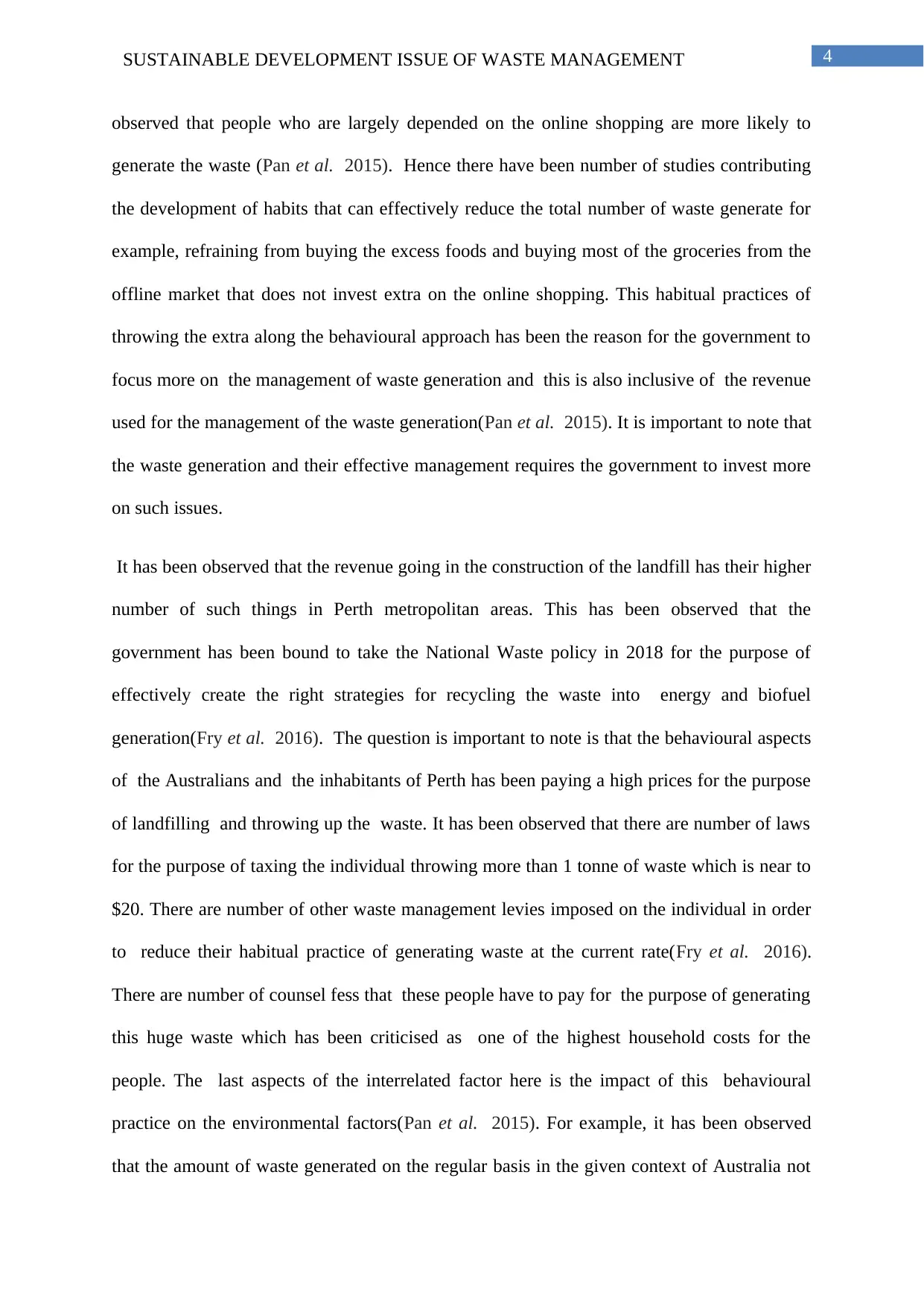
4SUSTAINABLE DEVELOPMENT ISSUE OF WASTE MANAGEMENT
observed that people who are largely depended on the online shopping are more likely to
generate the waste (Pan et al. 2015). Hence there have been number of studies contributing
the development of habits that can effectively reduce the total number of waste generate for
example, refraining from buying the excess foods and buying most of the groceries from the
offline market that does not invest extra on the online shopping. This habitual practices of
throwing the extra along the behavioural approach has been the reason for the government to
focus more on the management of waste generation and this is also inclusive of the revenue
used for the management of the waste generation(Pan et al. 2015). It is important to note that
the waste generation and their effective management requires the government to invest more
on such issues.
It has been observed that the revenue going in the construction of the landfill has their higher
number of such things in Perth metropolitan areas. This has been observed that the
government has been bound to take the National Waste policy in 2018 for the purpose of
effectively create the right strategies for recycling the waste into energy and biofuel
generation(Fry et al. 2016). The question is important to note is that the behavioural aspects
of the Australians and the inhabitants of Perth has been paying a high prices for the purpose
of landfilling and throwing up the waste. It has been observed that there are number of laws
for the purpose of taxing the individual throwing more than 1 tonne of waste which is near to
$20. There are number of other waste management levies imposed on the individual in order
to reduce their habitual practice of generating waste at the current rate(Fry et al. 2016).
There are number of counsel fess that these people have to pay for the purpose of generating
this huge waste which has been criticised as one of the highest household costs for the
people. The last aspects of the interrelated factor here is the impact of this behavioural
practice on the environmental factors(Pan et al. 2015). For example, it has been observed
that the amount of waste generated on the regular basis in the given context of Australia not
observed that people who are largely depended on the online shopping are more likely to
generate the waste (Pan et al. 2015). Hence there have been number of studies contributing
the development of habits that can effectively reduce the total number of waste generate for
example, refraining from buying the excess foods and buying most of the groceries from the
offline market that does not invest extra on the online shopping. This habitual practices of
throwing the extra along the behavioural approach has been the reason for the government to
focus more on the management of waste generation and this is also inclusive of the revenue
used for the management of the waste generation(Pan et al. 2015). It is important to note that
the waste generation and their effective management requires the government to invest more
on such issues.
It has been observed that the revenue going in the construction of the landfill has their higher
number of such things in Perth metropolitan areas. This has been observed that the
government has been bound to take the National Waste policy in 2018 for the purpose of
effectively create the right strategies for recycling the waste into energy and biofuel
generation(Fry et al. 2016). The question is important to note is that the behavioural aspects
of the Australians and the inhabitants of Perth has been paying a high prices for the purpose
of landfilling and throwing up the waste. It has been observed that there are number of laws
for the purpose of taxing the individual throwing more than 1 tonne of waste which is near to
$20. There are number of other waste management levies imposed on the individual in order
to reduce their habitual practice of generating waste at the current rate(Fry et al. 2016).
There are number of counsel fess that these people have to pay for the purpose of generating
this huge waste which has been criticised as one of the highest household costs for the
people. The last aspects of the interrelated factor here is the impact of this behavioural
practice on the environmental factors(Pan et al. 2015). For example, it has been observed
that the amount of waste generated on the regular basis in the given context of Australia not
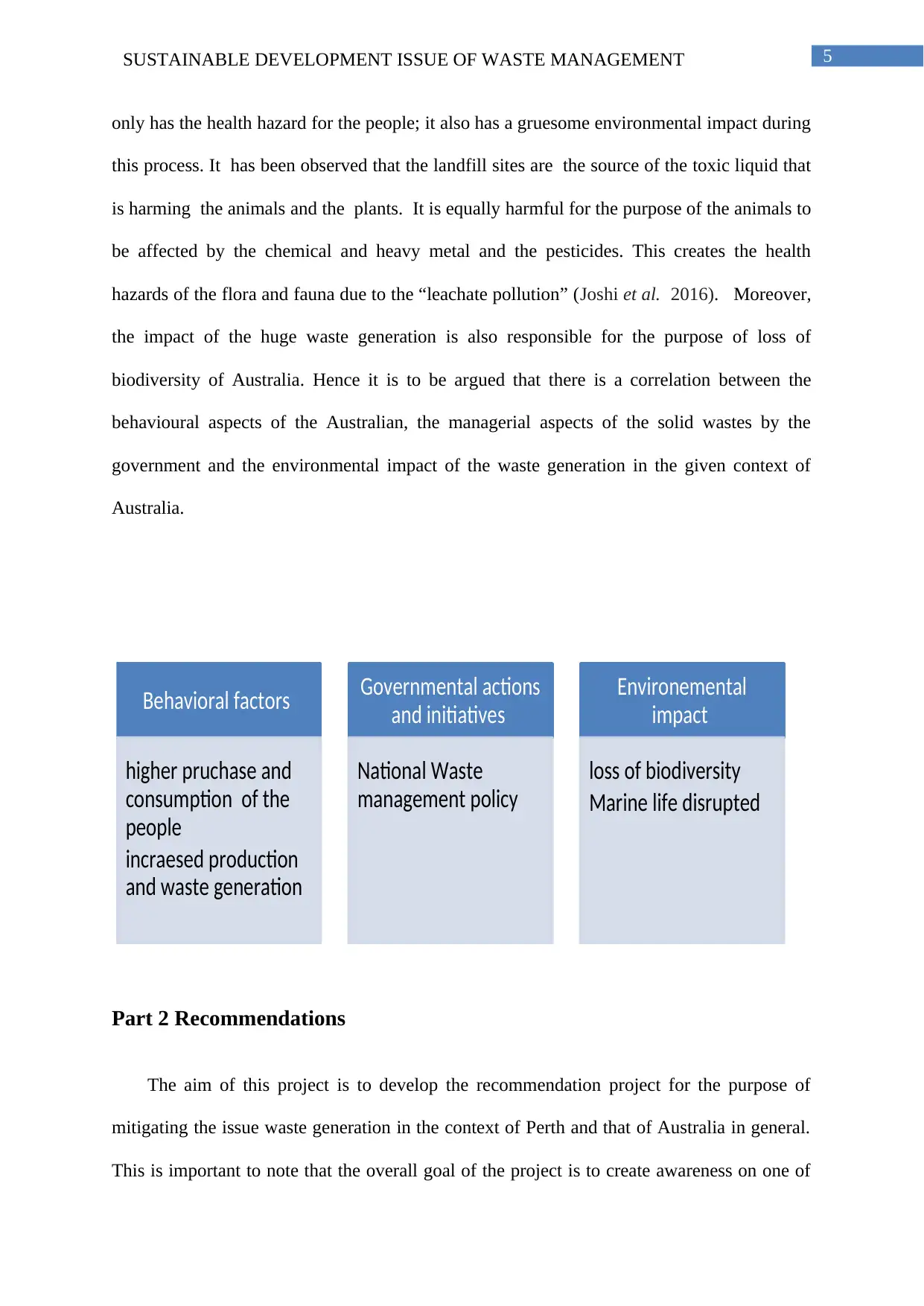
5SUSTAINABLE DEVELOPMENT ISSUE OF WASTE MANAGEMENT
only has the health hazard for the people; it also has a gruesome environmental impact during
this process. It has been observed that the landfill sites are the source of the toxic liquid that
is harming the animals and the plants. It is equally harmful for the purpose of the animals to
be affected by the chemical and heavy metal and the pesticides. This creates the health
hazards of the flora and fauna due to the “leachate pollution” (Joshi et al. 2016). Moreover,
the impact of the huge waste generation is also responsible for the purpose of loss of
biodiversity of Australia. Hence it is to be argued that there is a correlation between the
behavioural aspects of the Australian, the managerial aspects of the solid wastes by the
government and the environmental impact of the waste generation in the given context of
Australia.
Part 2 Recommendations
The aim of this project is to develop the recommendation project for the purpose of
mitigating the issue waste generation in the context of Perth and that of Australia in general.
This is important to note that the overall goal of the project is to create awareness on one of
Behavioral factors
higher pruchase and
consumption of the
people
incraesed production
and waste generation
Governmental actions
and initiatives
National Waste
management policy
Environemental
impact
loss of biodiversity
Marine life disrupted
only has the health hazard for the people; it also has a gruesome environmental impact during
this process. It has been observed that the landfill sites are the source of the toxic liquid that
is harming the animals and the plants. It is equally harmful for the purpose of the animals to
be affected by the chemical and heavy metal and the pesticides. This creates the health
hazards of the flora and fauna due to the “leachate pollution” (Joshi et al. 2016). Moreover,
the impact of the huge waste generation is also responsible for the purpose of loss of
biodiversity of Australia. Hence it is to be argued that there is a correlation between the
behavioural aspects of the Australian, the managerial aspects of the solid wastes by the
government and the environmental impact of the waste generation in the given context of
Australia.
Part 2 Recommendations
The aim of this project is to develop the recommendation project for the purpose of
mitigating the issue waste generation in the context of Perth and that of Australia in general.
This is important to note that the overall goal of the project is to create awareness on one of
Behavioral factors
higher pruchase and
consumption of the
people
incraesed production
and waste generation
Governmental actions
and initiatives
National Waste
management policy
Environemental
impact
loss of biodiversity
Marine life disrupted
⊘ This is a preview!⊘
Do you want full access?
Subscribe today to unlock all pages.

Trusted by 1+ million students worldwide
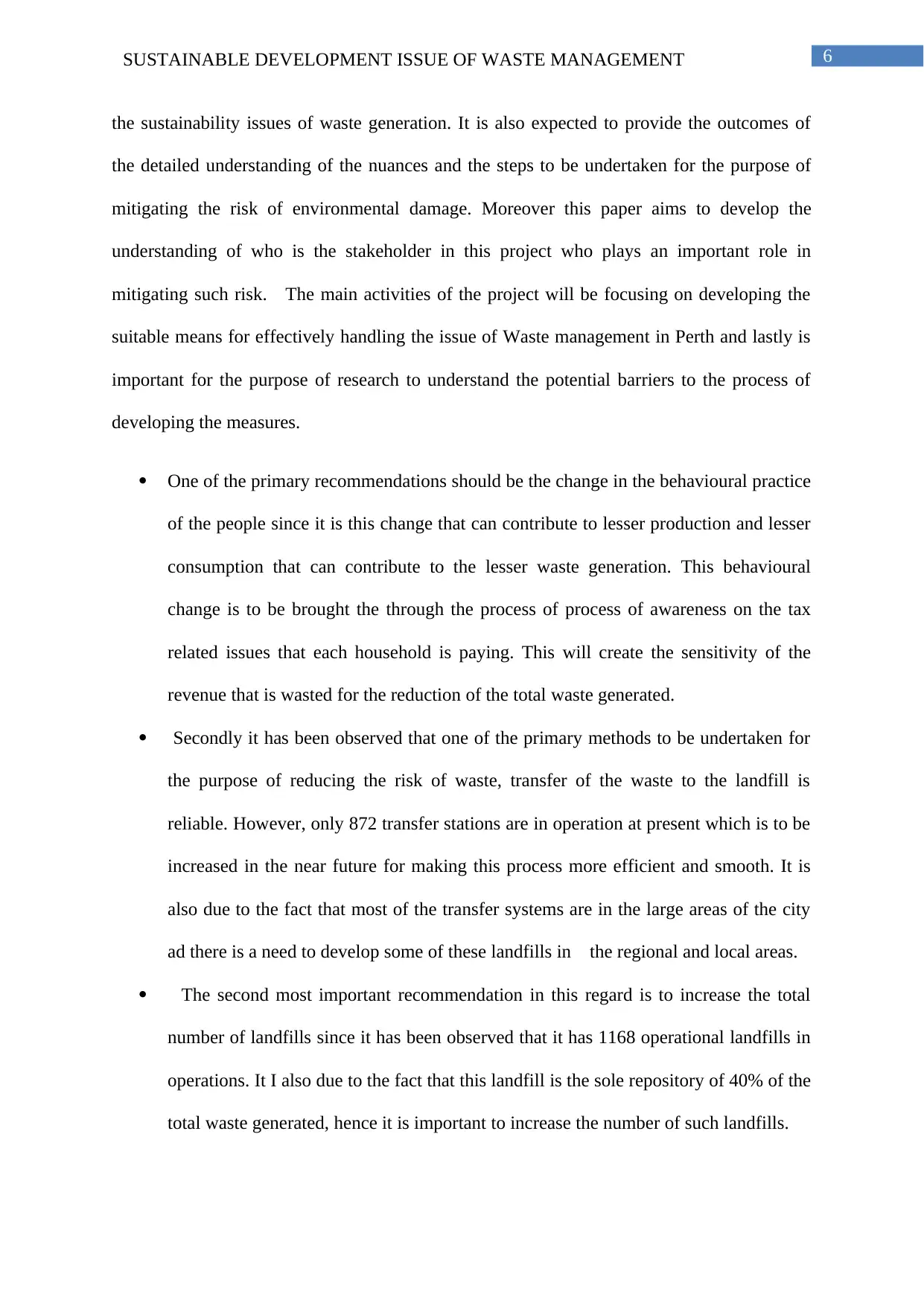
6SUSTAINABLE DEVELOPMENT ISSUE OF WASTE MANAGEMENT
the sustainability issues of waste generation. It is also expected to provide the outcomes of
the detailed understanding of the nuances and the steps to be undertaken for the purpose of
mitigating the risk of environmental damage. Moreover this paper aims to develop the
understanding of who is the stakeholder in this project who plays an important role in
mitigating such risk. The main activities of the project will be focusing on developing the
suitable means for effectively handling the issue of Waste management in Perth and lastly is
important for the purpose of research to understand the potential barriers to the process of
developing the measures.
One of the primary recommendations should be the change in the behavioural practice
of the people since it is this change that can contribute to lesser production and lesser
consumption that can contribute to the lesser waste generation. This behavioural
change is to be brought the through the process of process of awareness on the tax
related issues that each household is paying. This will create the sensitivity of the
revenue that is wasted for the reduction of the total waste generated.
Secondly it has been observed that one of the primary methods to be undertaken for
the purpose of reducing the risk of waste, transfer of the waste to the landfill is
reliable. However, only 872 transfer stations are in operation at present which is to be
increased in the near future for making this process more efficient and smooth. It is
also due to the fact that most of the transfer systems are in the large areas of the city
ad there is a need to develop some of these landfills in the regional and local areas.
The second most important recommendation in this regard is to increase the total
number of landfills since it has been observed that it has 1168 operational landfills in
operations. It I also due to the fact that this landfill is the sole repository of 40% of the
total waste generated, hence it is important to increase the number of such landfills.
the sustainability issues of waste generation. It is also expected to provide the outcomes of
the detailed understanding of the nuances and the steps to be undertaken for the purpose of
mitigating the risk of environmental damage. Moreover this paper aims to develop the
understanding of who is the stakeholder in this project who plays an important role in
mitigating such risk. The main activities of the project will be focusing on developing the
suitable means for effectively handling the issue of Waste management in Perth and lastly is
important for the purpose of research to understand the potential barriers to the process of
developing the measures.
One of the primary recommendations should be the change in the behavioural practice
of the people since it is this change that can contribute to lesser production and lesser
consumption that can contribute to the lesser waste generation. This behavioural
change is to be brought the through the process of process of awareness on the tax
related issues that each household is paying. This will create the sensitivity of the
revenue that is wasted for the reduction of the total waste generated.
Secondly it has been observed that one of the primary methods to be undertaken for
the purpose of reducing the risk of waste, transfer of the waste to the landfill is
reliable. However, only 872 transfer stations are in operation at present which is to be
increased in the near future for making this process more efficient and smooth. It is
also due to the fact that most of the transfer systems are in the large areas of the city
ad there is a need to develop some of these landfills in the regional and local areas.
The second most important recommendation in this regard is to increase the total
number of landfills since it has been observed that it has 1168 operational landfills in
operations. It I also due to the fact that this landfill is the sole repository of 40% of the
total waste generated, hence it is important to increase the number of such landfills.
Paraphrase This Document
Need a fresh take? Get an instant paraphrase of this document with our AI Paraphraser
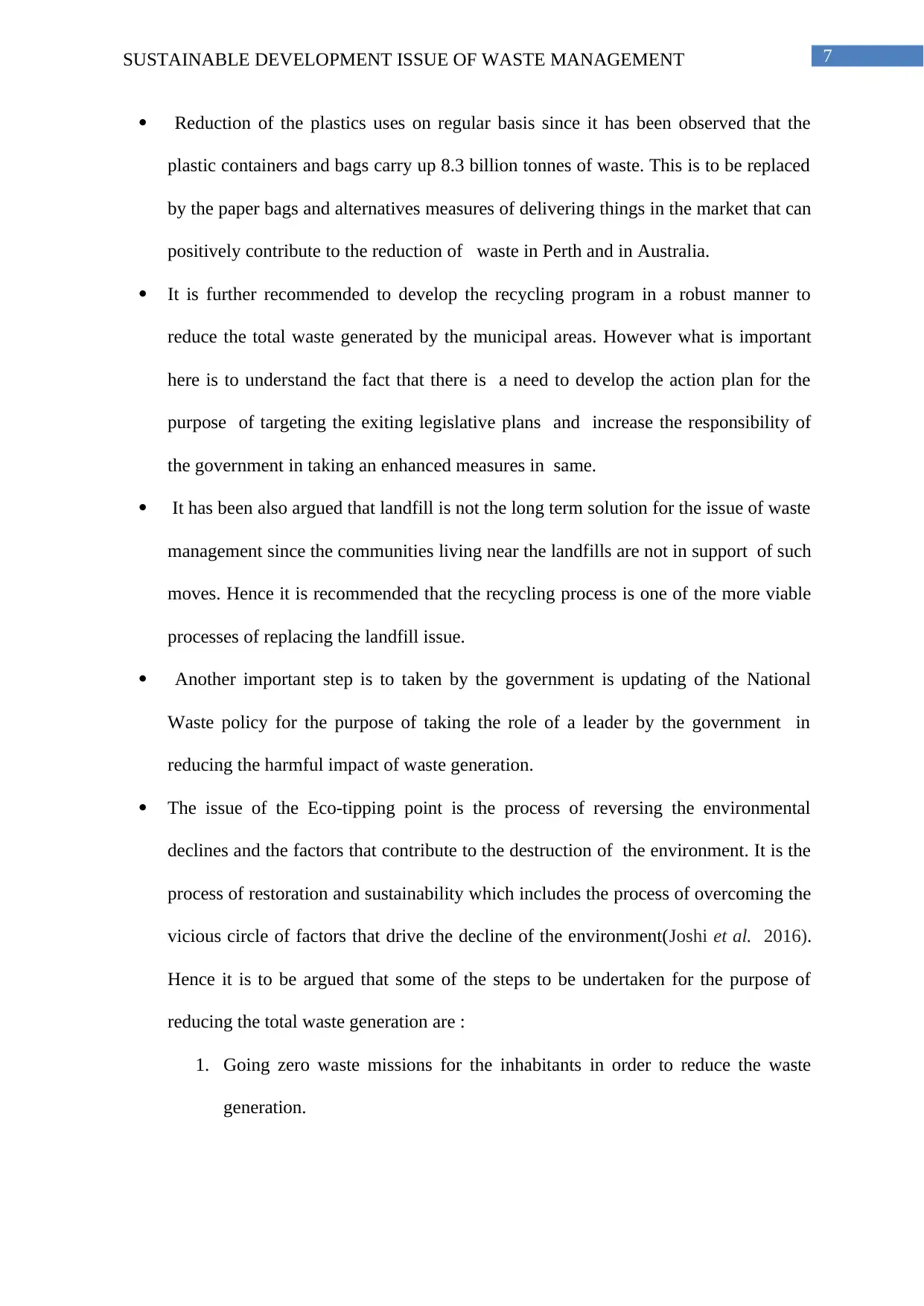
7SUSTAINABLE DEVELOPMENT ISSUE OF WASTE MANAGEMENT
Reduction of the plastics uses on regular basis since it has been observed that the
plastic containers and bags carry up 8.3 billion tonnes of waste. This is to be replaced
by the paper bags and alternatives measures of delivering things in the market that can
positively contribute to the reduction of waste in Perth and in Australia.
It is further recommended to develop the recycling program in a robust manner to
reduce the total waste generated by the municipal areas. However what is important
here is to understand the fact that there is a need to develop the action plan for the
purpose of targeting the exiting legislative plans and increase the responsibility of
the government in taking an enhanced measures in same.
It has been also argued that landfill is not the long term solution for the issue of waste
management since the communities living near the landfills are not in support of such
moves. Hence it is recommended that the recycling process is one of the more viable
processes of replacing the landfill issue.
Another important step is to taken by the government is updating of the National
Waste policy for the purpose of taking the role of a leader by the government in
reducing the harmful impact of waste generation.
The issue of the Eco-tipping point is the process of reversing the environmental
declines and the factors that contribute to the destruction of the environment. It is the
process of restoration and sustainability which includes the process of overcoming the
vicious circle of factors that drive the decline of the environment(Joshi et al. 2016).
Hence it is to be argued that some of the steps to be undertaken for the purpose of
reducing the total waste generation are :
1. Going zero waste missions for the inhabitants in order to reduce the waste
generation.
Reduction of the plastics uses on regular basis since it has been observed that the
plastic containers and bags carry up 8.3 billion tonnes of waste. This is to be replaced
by the paper bags and alternatives measures of delivering things in the market that can
positively contribute to the reduction of waste in Perth and in Australia.
It is further recommended to develop the recycling program in a robust manner to
reduce the total waste generated by the municipal areas. However what is important
here is to understand the fact that there is a need to develop the action plan for the
purpose of targeting the exiting legislative plans and increase the responsibility of
the government in taking an enhanced measures in same.
It has been also argued that landfill is not the long term solution for the issue of waste
management since the communities living near the landfills are not in support of such
moves. Hence it is recommended that the recycling process is one of the more viable
processes of replacing the landfill issue.
Another important step is to taken by the government is updating of the National
Waste policy for the purpose of taking the role of a leader by the government in
reducing the harmful impact of waste generation.
The issue of the Eco-tipping point is the process of reversing the environmental
declines and the factors that contribute to the destruction of the environment. It is the
process of restoration and sustainability which includes the process of overcoming the
vicious circle of factors that drive the decline of the environment(Joshi et al. 2016).
Hence it is to be argued that some of the steps to be undertaken for the purpose of
reducing the total waste generation are :
1. Going zero waste missions for the inhabitants in order to reduce the waste
generation.
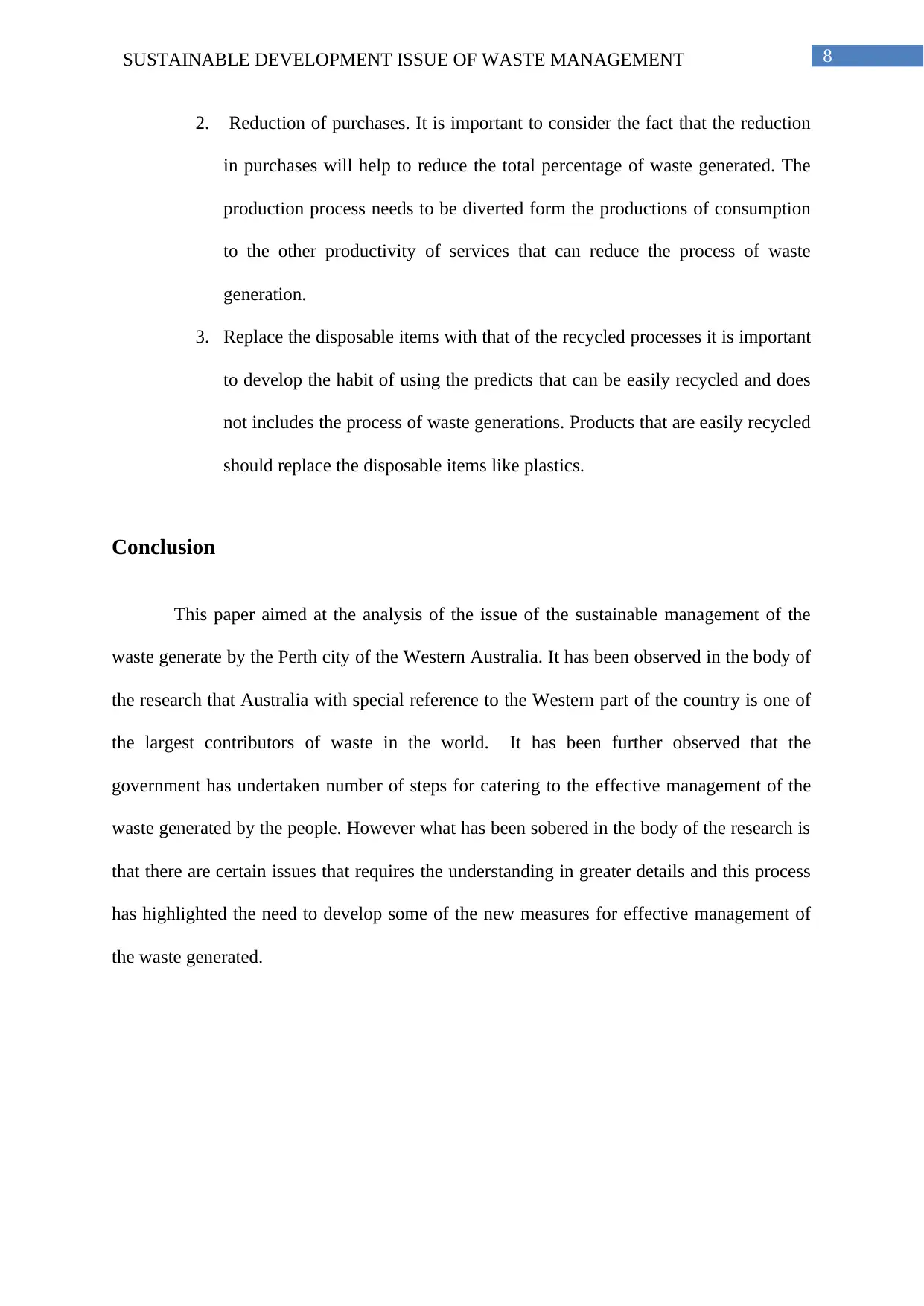
8SUSTAINABLE DEVELOPMENT ISSUE OF WASTE MANAGEMENT
2. Reduction of purchases. It is important to consider the fact that the reduction
in purchases will help to reduce the total percentage of waste generated. The
production process needs to be diverted form the productions of consumption
to the other productivity of services that can reduce the process of waste
generation.
3. Replace the disposable items with that of the recycled processes it is important
to develop the habit of using the predicts that can be easily recycled and does
not includes the process of waste generations. Products that are easily recycled
should replace the disposable items like plastics.
Conclusion
This paper aimed at the analysis of the issue of the sustainable management of the
waste generate by the Perth city of the Western Australia. It has been observed in the body of
the research that Australia with special reference to the Western part of the country is one of
the largest contributors of waste in the world. It has been further observed that the
government has undertaken number of steps for catering to the effective management of the
waste generated by the people. However what has been sobered in the body of the research is
that there are certain issues that requires the understanding in greater details and this process
has highlighted the need to develop some of the new measures for effective management of
the waste generated.
2. Reduction of purchases. It is important to consider the fact that the reduction
in purchases will help to reduce the total percentage of waste generated. The
production process needs to be diverted form the productions of consumption
to the other productivity of services that can reduce the process of waste
generation.
3. Replace the disposable items with that of the recycled processes it is important
to develop the habit of using the predicts that can be easily recycled and does
not includes the process of waste generations. Products that are easily recycled
should replace the disposable items like plastics.
Conclusion
This paper aimed at the analysis of the issue of the sustainable management of the
waste generate by the Perth city of the Western Australia. It has been observed in the body of
the research that Australia with special reference to the Western part of the country is one of
the largest contributors of waste in the world. It has been further observed that the
government has undertaken number of steps for catering to the effective management of the
waste generated by the people. However what has been sobered in the body of the research is
that there are certain issues that requires the understanding in greater details and this process
has highlighted the need to develop some of the new measures for effective management of
the waste generated.
⊘ This is a preview!⊘
Do you want full access?
Subscribe today to unlock all pages.

Trusted by 1+ million students worldwide
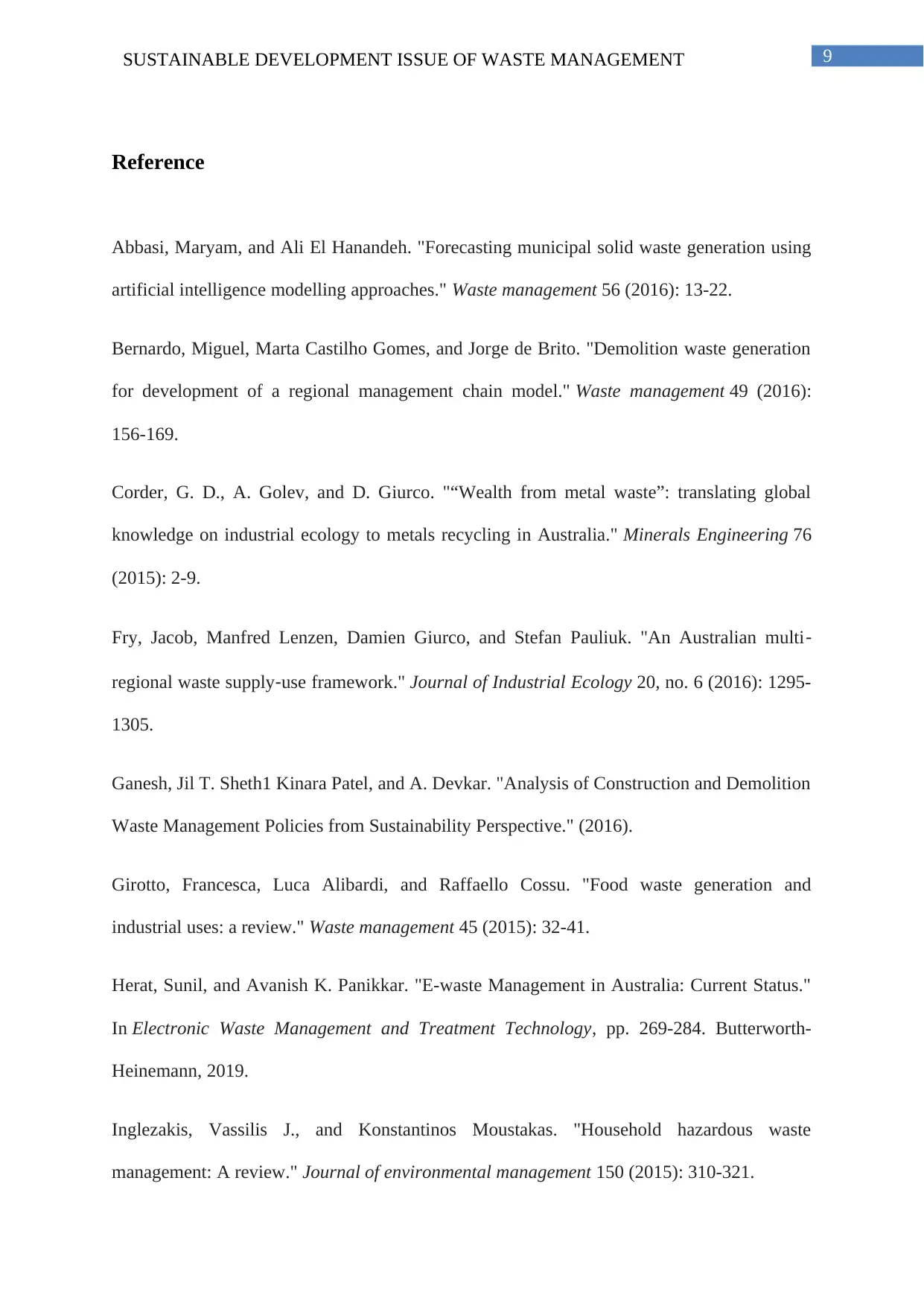
9SUSTAINABLE DEVELOPMENT ISSUE OF WASTE MANAGEMENT
Reference
Abbasi, Maryam, and Ali El Hanandeh. "Forecasting municipal solid waste generation using
artificial intelligence modelling approaches." Waste management 56 (2016): 13-22.
Bernardo, Miguel, Marta Castilho Gomes, and Jorge de Brito. "Demolition waste generation
for development of a regional management chain model." Waste management 49 (2016):
156-169.
Corder, G. D., A. Golev, and D. Giurco. "“Wealth from metal waste”: translating global
knowledge on industrial ecology to metals recycling in Australia." Minerals Engineering 76
(2015): 2-9.
Fry, Jacob, Manfred Lenzen, Damien Giurco, and Stefan Pauliuk. "An Australian multi‐
regional waste supply‐use framework." Journal of Industrial Ecology 20, no. 6 (2016): 1295-
1305.
Ganesh, Jil T. Sheth1 Kinara Patel, and A. Devkar. "Analysis of Construction and Demolition
Waste Management Policies from Sustainability Perspective." (2016).
Girotto, Francesca, Luca Alibardi, and Raffaello Cossu. "Food waste generation and
industrial uses: a review." Waste management 45 (2015): 32-41.
Herat, Sunil, and Avanish K. Panikkar. "E-waste Management in Australia: Current Status."
In Electronic Waste Management and Treatment Technology, pp. 269-284. Butterworth-
Heinemann, 2019.
Inglezakis, Vassilis J., and Konstantinos Moustakas. "Household hazardous waste
management: A review." Journal of environmental management 150 (2015): 310-321.
Reference
Abbasi, Maryam, and Ali El Hanandeh. "Forecasting municipal solid waste generation using
artificial intelligence modelling approaches." Waste management 56 (2016): 13-22.
Bernardo, Miguel, Marta Castilho Gomes, and Jorge de Brito. "Demolition waste generation
for development of a regional management chain model." Waste management 49 (2016):
156-169.
Corder, G. D., A. Golev, and D. Giurco. "“Wealth from metal waste”: translating global
knowledge on industrial ecology to metals recycling in Australia." Minerals Engineering 76
(2015): 2-9.
Fry, Jacob, Manfred Lenzen, Damien Giurco, and Stefan Pauliuk. "An Australian multi‐
regional waste supply‐use framework." Journal of Industrial Ecology 20, no. 6 (2016): 1295-
1305.
Ganesh, Jil T. Sheth1 Kinara Patel, and A. Devkar. "Analysis of Construction and Demolition
Waste Management Policies from Sustainability Perspective." (2016).
Girotto, Francesca, Luca Alibardi, and Raffaello Cossu. "Food waste generation and
industrial uses: a review." Waste management 45 (2015): 32-41.
Herat, Sunil, and Avanish K. Panikkar. "E-waste Management in Australia: Current Status."
In Electronic Waste Management and Treatment Technology, pp. 269-284. Butterworth-
Heinemann, 2019.
Inglezakis, Vassilis J., and Konstantinos Moustakas. "Household hazardous waste
management: A review." Journal of environmental management 150 (2015): 310-321.
Paraphrase This Document
Need a fresh take? Get an instant paraphrase of this document with our AI Paraphraser
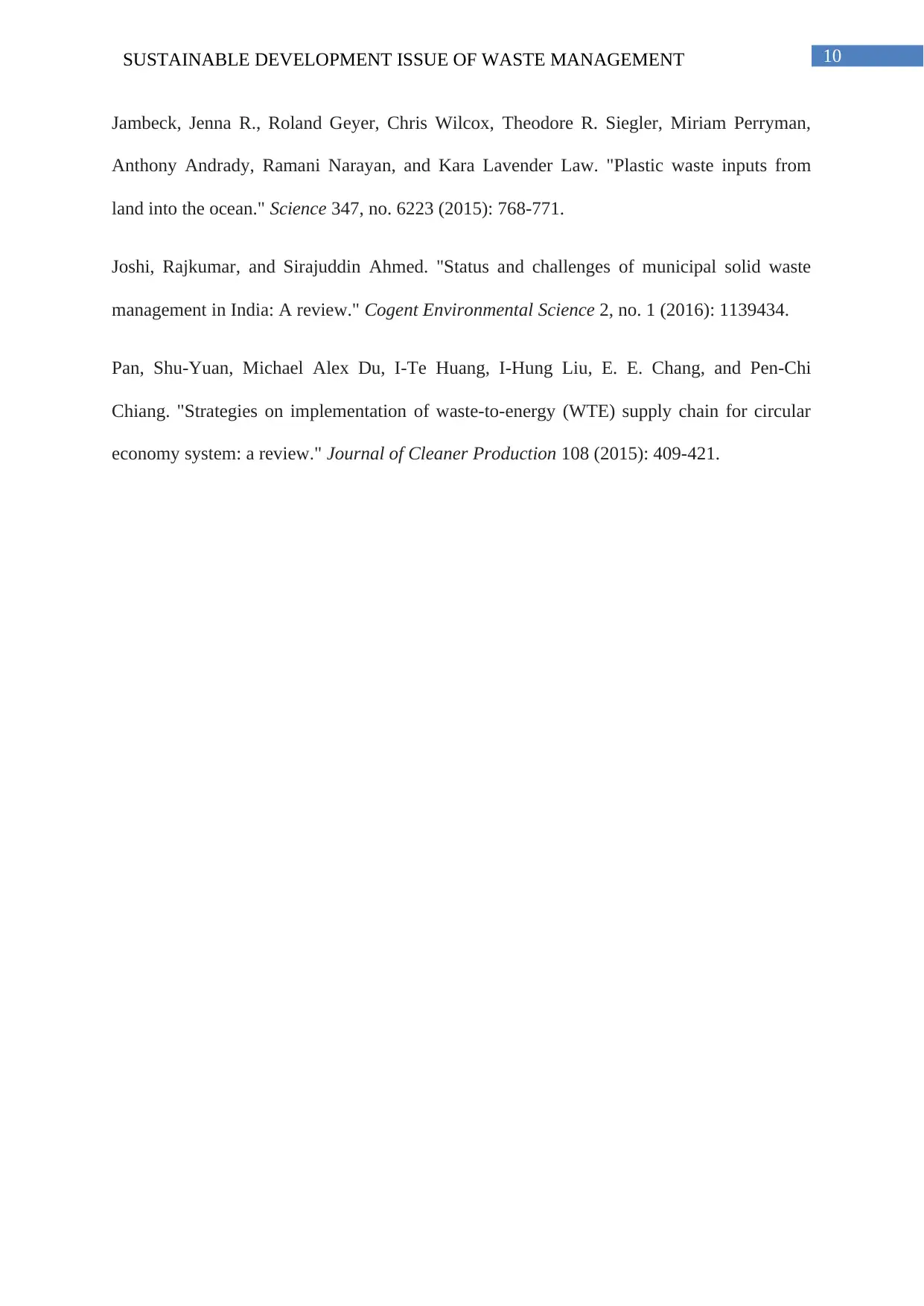
10SUSTAINABLE DEVELOPMENT ISSUE OF WASTE MANAGEMENT
Jambeck, Jenna R., Roland Geyer, Chris Wilcox, Theodore R. Siegler, Miriam Perryman,
Anthony Andrady, Ramani Narayan, and Kara Lavender Law. "Plastic waste inputs from
land into the ocean." Science 347, no. 6223 (2015): 768-771.
Joshi, Rajkumar, and Sirajuddin Ahmed. "Status and challenges of municipal solid waste
management in India: A review." Cogent Environmental Science 2, no. 1 (2016): 1139434.
Pan, Shu-Yuan, Michael Alex Du, I-Te Huang, I-Hung Liu, E. E. Chang, and Pen-Chi
Chiang. "Strategies on implementation of waste-to-energy (WTE) supply chain for circular
economy system: a review." Journal of Cleaner Production 108 (2015): 409-421.
Jambeck, Jenna R., Roland Geyer, Chris Wilcox, Theodore R. Siegler, Miriam Perryman,
Anthony Andrady, Ramani Narayan, and Kara Lavender Law. "Plastic waste inputs from
land into the ocean." Science 347, no. 6223 (2015): 768-771.
Joshi, Rajkumar, and Sirajuddin Ahmed. "Status and challenges of municipal solid waste
management in India: A review." Cogent Environmental Science 2, no. 1 (2016): 1139434.
Pan, Shu-Yuan, Michael Alex Du, I-Te Huang, I-Hung Liu, E. E. Chang, and Pen-Chi
Chiang. "Strategies on implementation of waste-to-energy (WTE) supply chain for circular
economy system: a review." Journal of Cleaner Production 108 (2015): 409-421.
1 out of 11
Related Documents
Your All-in-One AI-Powered Toolkit for Academic Success.
+13062052269
info@desklib.com
Available 24*7 on WhatsApp / Email
![[object Object]](/_next/static/media/star-bottom.7253800d.svg)
Unlock your academic potential
Copyright © 2020–2026 A2Z Services. All Rights Reserved. Developed and managed by ZUCOL.





